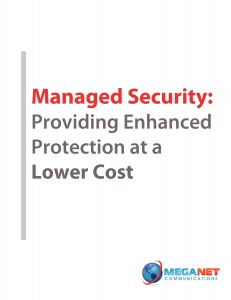Data loss is a subject that’s come up more and more in the news recently, and it’s an issue that’s certainly not going to go away any time soon. Thankfully, many companies have addressed concerns on their end by upgrading their network security, implementing employee policies, and instituting strict (but helpful) BYOD standards. Still, though, the aspects of data theft, and data loss, are very troubling and can affect businesses of any size across all industries.
Some companies opt to install a firewall that they’ve purchased locally at a big box store, in hopes of securing their network. Many times, these devices are basically glorified NAT boxes – equipment that assigns private internal-only IPs to computers and devices on the network, which help mitigate outside traffic breaking in, but not much else. Unfortunately we’ve seen far too many situations where a company has a relatively strong firewall installed, but many of the protective features are either not turned on, or set incorrectly.
While some networks are protected against inbound intrusion by firewalls, there are a lot of other places where a strong managed firewall can help as well. For instance, some firewalls can protect employees against virus downloads while web surfing, by blocking hidden backdoor downloads from happening unbeknownst to employees looking at websites. A strong firewall can also scan any documents or files being downloaded, to add another layer of protection along with local anti-virus software on employee computers.
What some companies don’t consider is that some times data loss and breaches occur due to activity inside their own network, such as employees emailing themselves sensitive data from the office, or by trying to run file sharing software that opens up their computer (and the local network) to intrusion. Not only can a managed firewall block this type of activity, it can also block employees from visiting suspect web sites, and log their activity in the event an employee is engaged in activities that are not productive, or at their worst, harmful to the company.
But setting up and configuring a firewall to do all these things is just a part of the process – just like any computer, a firewall has to be kept up to date to ensure the best protection. Virus definitions change daily, new websites looking to trick people into sharing sensitive information are always popping up, and you never know what a disgruntled employee might end up doing out of frustration down the road. By making sure the firewall’s software, definitions, and block criteria are kept up to date, a company’s data and network have a much better chance of staying protected vs. plugging in a firewall and simply walking away, figuring the job is done.
As mentioned above, you certainly wouldn’t plug in a new computer and not run updates to it’s operating system, nor would you install anti-virus protection and leave the definitions as they were when the software was released 6 months earlier. It’s vitally important to make sure security across the network is kept up to date, and that most definitely includes the firewall, which is many times the first step of defence. By making sure your company’s firewall is proactively managed, you can rest easy knowing that it’s up to date, and you’re being notified of any potential threats directed against your network (and blocked), along with potentially hurtful web habits or activities from your employees inside the network itself.
If your business is concerned with security, download our free eBook “Managed Security: Providing Enhanced Protection At A Lower Cost” to help determine the best methods to help keep your company protected.

